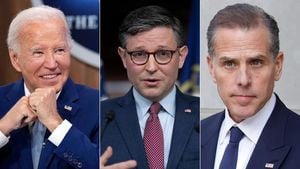Tensions erupted dramatically this weekend as Tbilisi became the epicenter of massive protests following the Georgian government's contentious decision to suspend negotiations to join the European Union. Demonstrations, which have intensified over three nights, have left numerous individuals hospitalized and sparked widespread unrest among citizens who feel betrayed by their leaders.
The unrest was triggered by Prime Minister Irakli Kobakhidze's announcement on December 1, stating Georgia would halt its aspirations to join the EU until 2028. This announcement coincided with the European Parliament's resolution criticizing November's parliamentary elections as neither free nor fair. The ruling Georgian Dream party's win was described by many as fraudulent, with allegations of Russian influence complicity, which only fueled the anger among protesters who demanded accountability and transparency.
During the protests, which saw tens of thousands of demonstrators gather outside parliament, attendees employed fireworks and even hurled stones at the police. The unrest escalated to the extent where law enforcement had to deploy water cannons and tear gas to disperse crowds, resulting in at least 44 hospitalizations, including protestors, police officers, and even journalists caught up in the chaos.
Prime Minister Kobakhidze did not shy away from issuing stern warnings against civil disobedience, proclaiming, "Any violation of the law will be met with the full rigor of the law," underscoring the government's no-nonsense approach to the continuing civil unrest. He went on to blame unspecified foreign entities for trying to destabilize Georgia, insinuations echoing longstanding suspicions of external manipulation pertaining to Georgia's political direction.
Symbolic acts of defiance were evident, including the burning of an effigy of Bidzina Ivanishvili, the founder of the Georgian Dream party. Ivanishvili, often viewed as the puppeteer behind Georgia's political machinations due to his wealth and influence, has been criticized for aligning the country more closely with Moscow. The government's stance against EU membership is perceived by many as redirecting Georgia's geopolitical aspirations back toward Russia.
Adding another layer of complexity to the situation is the U.S. State Department's claim on Saturday of suspending its strategic partnership with Georgia. This decision follows the widespread international condemnation of Georgia's withdrawal from EU negotiations, showcasing how rapidly relations can sour when democratic principles are perceived to be undermined.
Despite the unrest, Prime Minister Kobakhidze vowed to maintain the status quo, stating categorically, "The only thing we have rejected is the shameful and offensive blackmail"—a reference to criticisms from the EU lawmakers. He framed the EU’s actions as detrimental to Georgia’s prospects, claiming they represent an external effort to undermine national sovereignty.
President Salome Zourabichvili, who has emerged as the voice of opposition to the current government's direction, called the parliamentary elections and subsequent governmental maneuvers indicative of Georgia becoming increasingly like a "quasi-Russian state". "We are not demanding a revolution. We are asking for new elections, but under conditions ensuring the will of the people will not be misrepresented or stolen again," she stated emphatically.
Controversially, the government had already encountered backlash earlier this year when it passed legislation considered by many as limiting freedom of speech and targeting LGBTQ+ rights, bringing Georgia's commitment to democratic values under scrutiny.
The protests highlight deep divisions within Georgian society, fueled not only by concerns over EU accession but also by fears of returning to the most excessive forms of Russian influence—a sentiment echoed by the opposition, which continues to allege election fraud compounded by the Kremlin's presence.
Going forward, the European Union has urged the Georgian government to respect the public's right to assembly and expression and to refrain from using violence against peaceful demonstrators. The EU has previously granted Georgia candidate status contingent upon implementing specific reforms, yet this status remains precarious at best. January may see simplified communication between the nations, but for now, the road to democracy appears fraught with challenges.
Overall, the protests and the government's response encapsulate the volatile intersection of governance, national identity, and international diplomacy—a narrative steeped deeply within Georgia's 30-year struggle for independence and self-determination from Soviet influences.



